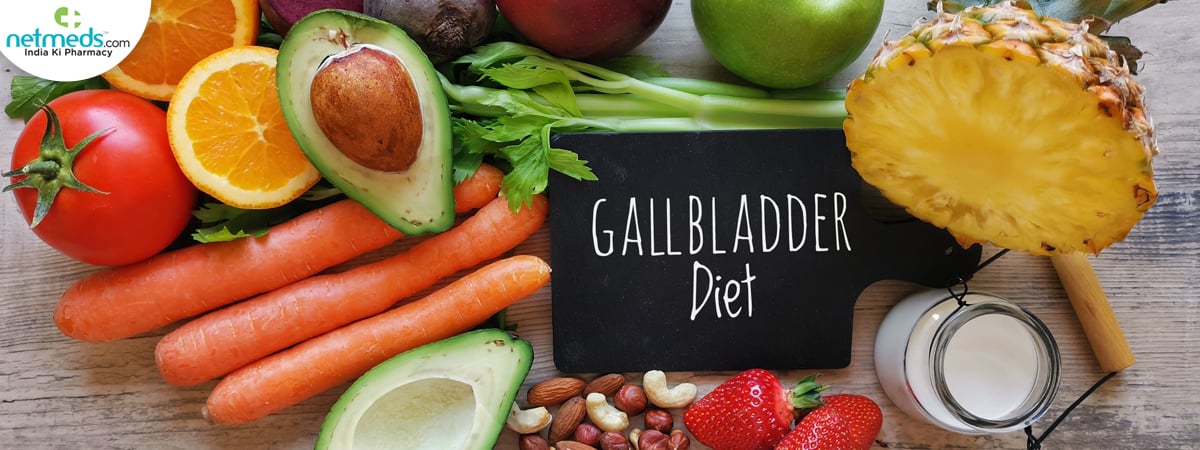Gallbladder polyps are growths that develop on the inside lining of the gallbladder, a small organ under the liver that helps with digestion. Most polyps are harmless and cause no symptoms; however, understanding polyps can help with early detection and treatment.
For Optimal Digestive Health, Shop From Our Best Range of Nutritional Supplements
What are Gallbladder Polyps?
Gallbladder polyps are abnormal tissue growths that bulge from the gallbladder wall into the gallbladder lumen. They usually differ in size, shape, and number, and are classified into two main categories: cholesterol polyps and adenomatous polyps. Cholesterol polyps are the most common type and are often benign, while adenomatous polyps have a higher risk of becoming cancerous.
Dive into this article to learn about gallbladder polyps, their causes, symptoms, and dietary therapy to manage this condition.
Causes of Gallbladder Polyps
The exact causes of gallbladder polyps are not very clear, but several factors may play a role:
Accumulation of cholesterol is the most common cause of gallbladder polyps, and it forms as pseudo-polyps.
Chronic gallbladder inflammation may trigger polyp formation.
Adenomas are a type of gallbladder polyp that can increase the risk of tumours.
A strong family history may increase the risks.
Metabolic syndrome, like obesity, diabetes, and high cholesterol, may play a role.
Also Read: Gallbladder Diet: Eat This And Avoid That For Healthy Functioning Of This Digestive Organ
Symptoms of Gallbladder Polyps
Most gallbladder polyps are asymptomatic and are mostly diagnosed during imaging studies for other conditions. However, when symptoms do occur, they may include:
Discomfort or pain in the upper right abdomen, especially after eating heavy, fat-rich meals.
Nausea and vomiting may occur, especially during episodes of gallbladder inflammation.
A feeling of fullness or bloating after meals.
Difficulty digesting fatty foods and processed foods.
Warning Signs
Though most gallbladder polyps are benign, certain symptoms may indicate complications or the presence of cancer. Seek immediate medical attention if you experience:
Severe abdominal pain that does not settle.
Fever and chills, which may indicate infection.
Sudden weight loss.
Dietary Management
It is important to understand that diet alone cannot shrink or get rid of gallbladder polyps; however, healthy eating habits can ease pain, promote digestion, and reduce risk factors like cholesterol accumulation.
Foods to Include
Add a good lot of high-fiber foods like whole grains, oats, beans, lentils, fruits, and vegetables to aid digestion.
Choose from a broad range of healthy cooking oils like olive oil, avocado, flaxseeds, and nuts in moderation.
Add lean proteins like skinless chicken, fish, tofu, and legumes.
Maintain good hydration and include plenty of hydrating foods such as cucumbers, watermelon, soups, and herbal teas to support bile flow.
Foods to Avoid
Deep-fried snacks, fast food, and high-fat meats.
Refined carbs, sugary snacks, and packaged items.
Full-fat dairy, like cheese, butter, cream, and whole milk.
Excess caffeine and alcohol to be avoided as they can irritate the digestive tract.
Lifestyle Modifications
Eat smaller, more frequent meals to support digestion.
Maintain a healthy weight to reduce the risk of inflammation and metabolic syndrome.
Stay active with regular physical exercise.
Drink plenty of water to support bile movement.
Conclusion
Gallbladder polyps are generally harmless but may need continuous monitoring through ultrasound imaging, especially for polyps larger than 1 cm or if they cause symptoms. A wholesome and varied diet rich in fiber, lean proteins, and healthy fats can support gallbladder health and reduce complications. If you experience constant abdominal pain, jaundice, or digestive discomfort, consult a healthcare provider for precise treatment.
(This article is reviewed by Kalyani, Chief Content Editor)
Author Profile:
M Sowmya Binu:
With over 15 years of expertise and a Postgraduate degree in Nutrition, M Sowmya Binu is a seasoned professional in the field of nutrition. Specialising in tailoring personalised diet plans, she underscores the significance of a balanced approach to health, emphasising the integration of medication with dietary intake for holistic wellness. Passionate about equipping individuals with knowledge to make informed decisions, Sowmya adeptly develops insightful content encompassing a wide array of topics, including food, nutrition, supplements, and overall health.
References:
Metabolic status and lifestyle factors associated with gallbladder polyps: a covariance structure analysis
Song Leng 1,2, Ai Zhao 3, Qiang Li 1, Leilei Pei 1, Wei Zheng 4, Rui Liang 2, Hong Yan 1,✉
Advances in the management of gallbladder polyps: establishment of predictive models and the rise of gallbladder-preserving polypectomy procedures
Haoran Liu, Yongda Lu, Kanger Shen, Ming Zhou, Xiaozhe Mao & Rui Li
https://bmcgastroenterol.biomedcentral.com/articles/10.1186/s12876-023-03094-7




 Previous
Previous